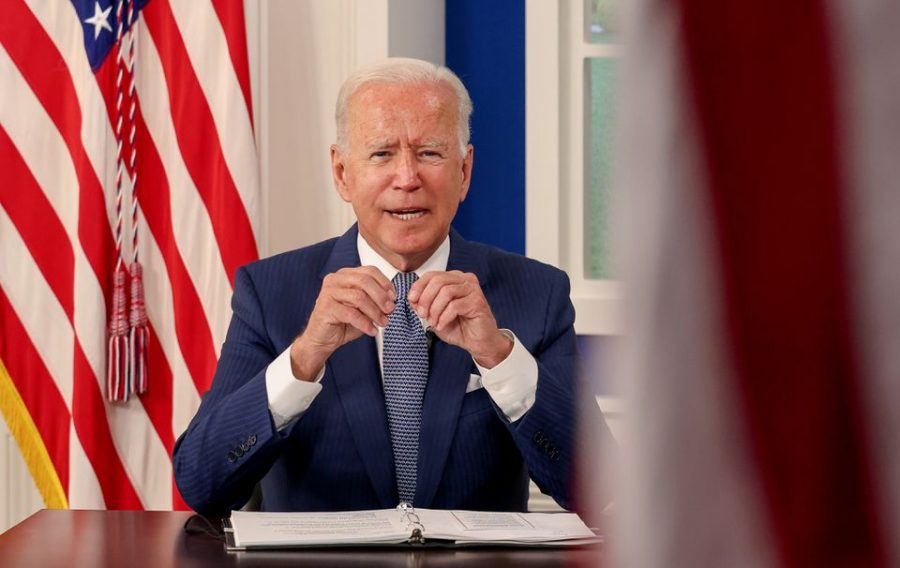What happens when the money runs out?
Thursday, Oct. 14, Biden signs off on a $480 billion increase to the nation’s debt ceiling, staving off a government shutdown until Dec. 3. While raising the debt ceiling is usually a simple process, the political agendas surrounding this year’s vote have made the process much more controversial.
The United States is trillions of dollars in debt. 28.9 trillion to be specific. And each year Congress votes to raise the debt ceiling, putting the U.S. further in debt in order to spend more money on necessary expenses. Surrounding this year’s vote, however, were waves of political agendas which held the nation’s finances captive, threatening a government shutdown.
The forefront of this issue consists of two proposed bills: the infrastructure bill and Build Back Better package. Both aim to benefit American infrastructure and citizens but require large sums of money — $1 trillion for the first and $3.5 trillion for the latter. If Congress wants these bills to pass, they would need to raise the debt ceiling, which is how much money the national government is allowed to borrow, to pay for them. While improvements to infrastructure and societal programs may sound ideal, debates over these bills delayed raising the debt ceiling and with it the government’s funds, creating the looming threat of a government shutdown on Oct. 18.
“The hold-up, if you will, is the progressive caucus in the House [of Representatives],” U.S. government teacher Erika Sugarmon said. “They’re saying we’re not going to sign [the infrastructure bill] unless you allow for our [social programs] … having said that, the push back from the other side, if you will, the more conservative side, is that these are social programs — [they say that] this is socialism … but they do want the infrastructure bill to pass through, so the House is kind of holding everything hostage.”
Recently emerging from an economic recession caused by COVID-19, many saw the possible shutdown as another possible economic downturn, the likes of which could have outstretched effects on not only the government but its citizens and businesses as well.
“We’re just bouncing back economically from COVID, [and] I mean the economy wasn’t great, and then COVID hit, and obviously, it hit rock bottom,” world history teacher Chad Odle said. “We’re still recovering from that, and so to have a government shutdown right now would just not be good.”
Others argue that the effects of a temporary shutdown, while negative in the short term, may lead to positive outcomes that would have lasting benefits on American infrastructure and society.
“The progressive caucus, of course, I support their cause, and I think they should fight to the very end, and so what [if] they close down the whole country for a day, a week or what have you. The other side, the conservatives, have done it before, and so we have got to fight back,” Sugarmon said. “In the long run, it would be beneficial to the working-class people, but in the short run, the working-class people would be hurt, so it depends on how you look at it.”
However, Oct. 18 came, and along with it came no government shutdown; instead, Congress suspended the debt ceiling, giving its members until Dec. 3 to make a decision. When that time comes, however, the same problems remain: what should the debt limit be raised for, and should the limit even be allowed to raise more?
“If we continue to raise the debt limit, then it definitely will not be in our favor, but if we can make the ceiling rise for only appropriate programs, then it will be beneficial for the national debt we already have to pay,” London Haines (9) said.
While it remains unknown whether these bills will be passed, the events surrounding the suspension of the debt ceiling raise concerns that are important to not only older generations but also younger generations. As the country continues to go further in debt and the government makes decisions that affect American lives, it becomes even more evident that it is up to every citizen to be informed if there can be any hope of improvement.
“We have made a mess of our economy; we have made a mess of our reputation worldwide, [and] we have made a mess environmentally,” Sugarmon said. “We’ve put this country into debt, and it’s going to be up to your generation to fix it.”
The direct effects of politics may seem far from the lives of White Station students, but the outcomes of these bills and laws passed through Congress have far-reaching outcomes that can influence not only the present but the future as high school soon becomes college, and the age to vote comes ever closer. Change starts in the classrooms of every high school and the minds of every high schooler throughout America.
“Our role as young citizens is to learn from our examples,” Haines said. “We as high schoolers have a voice, but first, we have to understand the rights and wrongs of the people before us.”
Your donation will support the student journalists of White Station High School. Your contribution will allow us to purchase equipment and cover our annual website hosting costs.








































